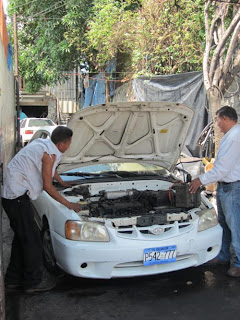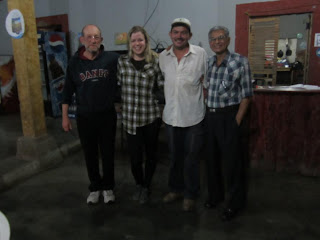Where can I begin this post? First, "Lucha" = Struggle. I am slowly falling deeper into this country and all it's history that no one seem to ever hear.
I'll start with the bad...and try to end with the good. There's so much more than what I have time to pound out on this keyboard. In due time I'll share!
First. El Mozote and Perquin's War Museum. We arrived in "Rebel territory" around 3 p.m. Monday after a night of driving in the dark, a lunch with a well known Pastor here in San Salvador talking to us about the war and drug trafficking and the powers-that-be over chimichangas and tacos, a morning of our car stalling and dying, ending in me directing traffic and helping to push the car down the street.
So, when the war started, civilians headed for the mountains simply because that's where their opportunity rested. Where they could become strong, initiate peace talks, and collaborate hope for social justice. Where they could teach their community reading and writing and how to stand up for what you believe in - rights, justice, and truth. Yet also where they armed and protected themselves and showed they would not be taken without a fight. Although I am not a believer in violence, I am a believer in standing up and fighting for what you believe at your core is right. And for that I respect them.
So the war museum in Perquin showed them. Their photos, their colours, their faces. The ones who were murdered and the massacred and were "disappeared" by the Salvadoran Government and Military. Our guide there was of a local indigenous tribe and explained that because none of them had the opportunity to become educated, the potential lies within the youth's hands to learn, educate and fight for the transformation of this country's social justice.
El Mozote was different. It is a massacre site where the troops killed over 700 people in an intent to instil terror and fear in the people. In December of 1989, they gathered the people of this unassuming town in the town square and separated the boys from the girls. They killed the boys and fathers. They separated out the girls under 9 years old, raped them and killed them so their mothers would hear the screams. And then they came for the mothers. In this small town, there is a memorial wall that shows the names of all (they could find) who had died. There is a memorial church where the bodies of all the children are buried. The youngest in the community was 3 days old and the oldest, 90 years old.
 |
Learning about what it was really like during the war
and the now (and ever) present economic &
political issues from Carlos & his wife. |
 |
| No more repression. |
 |
| Our trip to El Mozote not starting off well.. |
 |
They are not with the dead,
they are with us
with you
and with all of humanity. |
 |
| The genocide memorial. |
 |
| The memorial where all of the children's bodies are buried. |
 |
In the garden of reflection near the site.
There is still beauty present amidst all the sorrow. |
 |
President of the Human Rights Commission
of El Salvador. Assassinated for defending
the rights of her people, March 14, 1983 |
 |
| The faces of the war. |
 |
| 50% of Salvadorans live in misery. |
 |
At the bottom it reads: Join the
National Campaign to stop the
U.S. sponsored bombing
of El Salvador.
See me? |
 |
"Salvador" (his rebel name) after speaking to us about
the cooperatives and his part in the war. |
At our small hotel, we had a humble dinner of rice and plaintains and a man came to sit with us. He told us of how he was in the rebel troops. The army was taking people from every village or killing them so him and his brother fled. He was 11 at the time. He had been shot three times and showed us his scars. Yet his outlook on the war was a positive one, which was ...different...nice different...to hear. He learned to read, write, cook, work with propaganda and the press and do special projects. He felt that the war showed the people that they had a voice and allowed them the opportunity to realize their potential.
Yesterday, we went first to Oscar Romero's Chapel and then to the University of Central America. Romero was a pastor of the people. He was elected Archbishop and had decided to keep politics completely out of religion. He didn't want a part of what was going on in the country outside of religion. However, his best friend was assassinated a year later and that began to change the way he saw what was going on in his country. In his last sermon, he called on the army to put down their arms and to stop killing their own people. The next day, March 24, 1989, he was assassinated when giving mass. Shot through the heart by a drive-by sharpshooter (who is now a car dealer in San Francisco and lives safely in the States). He had been quoted months earlier saying that if he was killed, his spirit would rise in his people.
Next, at the UCA, six Jesuits were hauled out of their rooms and murdered by the Salvadoran military..along with the housekeeper and her daughter whom were raped & murdered. Brutally. I saw pictures of their dead, ravaged bodies. I felt sick to my stomach with the evilness of humans...which created a philosophical discussion last night at dinner about what this evil balance is in life? Where did it come from? Is it man? Is it the "devil"? Is it money and greed? Or all of the above? Honestly, it raises so many questions that we can't begin to answer at this time.
Yet, there is the good. The University is now about hope. It is taking all middle class students and part of their program - every program - is working with the poor and among the poor. It's turned something awful into something resilient and strong. It's turned into an opportunity for the youth and humanity of El Salvador.
Just prior to posting this, I've posted a blog titled "Let the Poor Break Your Heart". It is written by Dean Brackley and is from a short book titled The University and Its Martyrs: Hope from Central America. I found it profound and I hope you take the time to read it.
 |
The point from where Romero was shot, just outside the
doors in a drive-by shooting. |
 |
"If I die, I will return & rise in the Salvadoran people."
Spoken a few months prior to his assassination. |
Last night Otoniel talked to us about the hope for a Food Security Project (the one I am here to potentially intern with next year). More to come on that. Today we're meeting with a former Rebel Commander of the guerrilla army and his wife, the Director of the Women's Rights Organization whom Jim and Brenda know well. And Thursday...if you can believe this...she has us lined up for a meeting with the (
correction) Director of a Salvadoran Human Rights Organization for FESPED (Fundacion de Estudios para la Aplicacion del Derecho)!! Excuse the punctuation marks, but I am mucho, muchisimo excited.
 |
The rebel army hills.
So much beauty, hope & resiliance in this broken land
of El Salvador. |
























0 comments:
Post a Comment